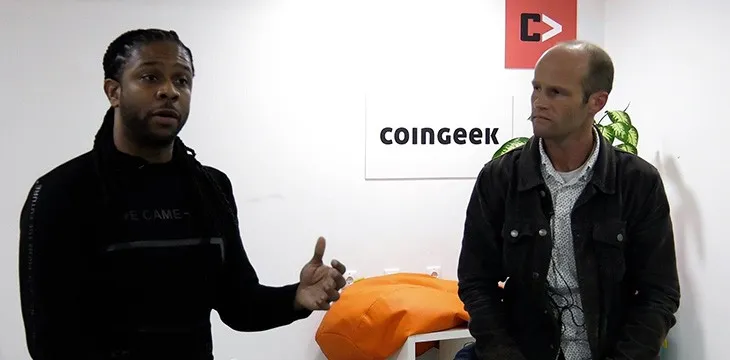|
Getting your Trinity Audio player ready...
|
The recent Cambrian SV Bootcamp in Lisbon brought together about 30 developers and entrepreneurs from around the world. As well as writing code to make their businesses more interoperable, there was time for wider discussion, some of which took place in two debates where issues were aired in front of the rest of the attendees.
The first of those debates makes up this week’s CoinGeek Conversations podcast. It’s between Ryan X. Charles of Money Button and Jimmy Odom of Bittboard (right and left, above). Their subject: how different are Bitcoin businesses from any other kind?
For Jimmy, Bitcoin businesses are different because of their being able to link data and money: “I think that this is the first time that we’ve had the ability in human history to truly associate the value of information. Before, there would always be guardrails or gatekeepers or intermediaries who would assign the value of information. But Bitcoin being the open protocol that it is, gives not only the ability to assign that value, but to evenly distribute the information behind the assigning of that value.”
Ryan was less inclined to see Bitcoin businesses as fundamentally different because “it’s actually the same rules of business and the same rules of economics that it’s always been”. He warned that where Bitcoin entrepreneurs (or those in the wider crypto sector) had seen themselves as outside of the ordinary rules of business, it had resulted in dodgy ICOs and scams and that “some of those people have actually gone to prison”.
Although the tech giants have come in for plenty of criticism from the crypto world and elsewhere, Ryan said that “although I think that Google and Facebook has done a lot of things wrong, a lot of businesses in crypto have done things way worse than Google and Facebook, at least on a smaller scale.”
For Jimmy, “neither Google nor Facebook were ever propositioning themselves as moral standard bearers”. Ryan saw the basic problem as being that they “sort of slyly cover up some of the things that they’re doing …I think they don’t quite get the morality right. I think that has a lot to do with the fact that they can continue with business models that are ultimately, I think – I hate to be extreme – but I think will ultimately fail. They can’t just sell other people’s private data and have that be the way things work forever”.
Jimmy sees Bitcoin as more like a natural phenomenon than an ingenious piece of technology, describing it as “this really fascinating discovery – because I don’t think it was invented”. The morality that Bitcoin promotes through the way it works relates to his strong Christian faith, with Bitcoin and Christian morality in sync and relating to “the higher power”.
More than once in the debate, Ryan said that he wanted to “both agree and disagree” with Jimmy’s view, but he went along with the idea that Bitcoin promotes better behaviour by businesses: “I think it actually does encourage a better morality because companies basically have to be more transparent and accountable than they used to be. So it encourages the right thing.”
If you’d like to read the transcript to this podcast, you can download it here.
Listen to the whole of the first Cambrian SV Debate on this week’s CoinGeek Conversation podcast:
You can also watch the podcast video on YouTube.
Please subscribe to CoinGeek Conversations – this is the eighth episode of the podcast’s third season. If you’re new to it, there are plenty of episodes from the first two seasons to catch up with.
Here’s how to find them:
– Search for “CoinGeek Conversations” wherever you get your podcasts
– Subscribe on iTunes
– Listen on Spotify
– Visit the CoinGeek Conversations website
– Watch on the CoinGeek Conversations YouTube playlist

 07-05-2025
07-05-2025 





